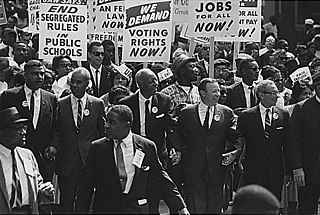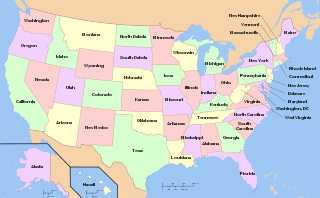
The International Red Cross and Red Crescent Movement is an international humanitarian movement with approximately 17 million volunteers, members and staff worldwide which was founded to protect human life and health, to ensure respect for all human beings, and to prevent and alleviate human suffering.

Scouting or the Scout Movement is a movement that aims to support young people in their physical, mental and spiritual development, that they may play constructive roles in society, with a strong focus on the outdoors and survival skills.
During the first half of the twentieth century, the movement grew to encompass three major age groups for boys and, in 1910, a new organization, Girl Guides, was created for girls. It is one of several worldwide youth organizations.

The Non-Aligned Movement (NAM) is a forum of 120 developing world states that are not formally aligned with or against any major power bloc. After the United Nations, it is the largest grouping of states world-wide.

The environmental movement, also including conservation and green politics, is a diverse scientific, social, and political movement for addressing environmental issues. Environmentalists advocate the sustainable management of resources and stewardship of the environment through changes in public policy and individual behavior. In its recognition of humanity as a participant in ecosystems, the movement is centered on ecology, health, and human rights.

The civil rights movement in the United States was a decades-long struggle with the goal of enforcing constitutional and legal rights for African Americans that other Americans already enjoyed. With roots that dated back to the Reconstruction era during the late 19th century, the movement achieved its largest legislative gains in the mid-1960s, after years of direct actions and grassroots protests that were organized from the mid-1950s until 1968. Encompassing strategies, various groups, and organized social movements to accomplish the goals of ending legalized racial segregation, disenfranchisement, and discrimination in the United States, the movement, using major nonviolent campaigns, eventually secured new recognition in federal law and federal protection for all Americans.

The temperance movement is a social movement against the consumption of alcoholic beverages. Participants in the movement typically criticize alcohol intoxication or promote complete abstinence (teetotalism), with leaders emphasizing alcohol's negative effects on health, personality, and family life. Typically the movement promotes alcohol education as well as demands new laws against the selling of alcohols, or those regulating the availability of alcohol, or those completely prohibiting it. During the 19th and early 20th centuries, the temperance movement became prominent in many countries, particularly English-speaking and Scandinavian ones, and it led to Prohibition in the United States from 1920 to 1933.
A resistance movement is an organized effort by some portion of the civil population of a country to withstand the legally established government or an occupying power and to disrupt civil order and stability. It may seek to achieve its objectives through either the use of nonviolent resistance, or the use of force, whether armed or unarmed. In many cases, as for example in Norway in the Second World War, a resistance movement may employ both violent and non-violent methods, usually operating under different organizations and acting in different phases or geographical areas within a country.

The Communist Party of India (CPI) is the oldest communist party in India. There are different views on exactly when it was founded. The date maintained as the foundation day by the CPI is 26 December 1925. The Communist Party of India (Marxist), which separated from the CPI in 1964 following an ideological rift between China and the Soviet Union, continues to claim having been founded in 1925.

Environmentalism or environmental rights is a broad philosophy, ideology, and social movement regarding concerns for environmental protection and improvement of the health of the environment, particularly as the measure for this health seeks to incorporate the impact of changes to the environment on humans, animals, plants and non-living matter. While environmentalism focuses more on the environmental and nature-related aspects of green ideology and politics, ecology combines the ideology of social ecology and environmentalism. Ecology is more commonly used in continental European languages while ‘environmentalism’ is more commonly used in English but the words have slightly different connotations.
The World Union of National Socialists (WUNS) is an organisation founded in 1962 as an umbrella group for neo-Nazi organisations across the globe.

Federalism in the United States, also referred to as the doctrine of shared sovereignty, is the constitutional division of power between U.S. state governments and the federal government of the United States. Since the founding of the country, and particularly with the end of the American Civil War, power shifted away from the states and towards the national government. The progression of federalism includes dual, state-centered, and new federalism.
Settlement movement is a term used in Israel to describe national umbrella organisations for kibbutzim, moshavim, moshavim shitufiim, and community settlements. It is not related to the term Israeli settlement, which denotes settlements outside the Green Line.

Protestantism is the second largest form of Christianity with collectively between 800 million and more than 900 million adherents worldwide or nearly 40% of all Christians. It originated with the 16th century Reformation, a movement against what its followers perceived to be errors in the Roman Catholic Church. Protestants reject the Roman Catholic doctrine of papal supremacy and sacraments, but disagree among themselves regarding the real presence of Christ in the Eucharist. They emphasize the priesthood of all believers, justification by faith alone rather than by good works, and the highest authority of the Bible alone in faith and morals. The "five solae" summarise basic theological differences in opposition to the Roman Catholic Church.
The labour movement or labor movement consists of two main wings, the trade union movement or labor union movement, also called trade unionism or labor unionism on the one hand, and the political labour movement on the other.










